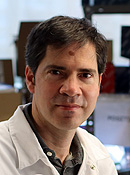Clinical specialization in Immunology (1996-2000) and my PhD (2000-2003) in La Princesa Hospital/UAM. Postdoc at the London Research Institute (Cancer Research UK, 2004-2009) where I found a new C-type lectin (CLR), named DNGR-1/CLEC9A, as a selective cDC1 marker driving cross-priming (JCI, 2008; Nature, 2009).
On my return to Spain (Ramón y Cajal, 2009), I established the Immunobiology lab at CNIC, funded by continuous support from Plan Estatal since 2010. Funded by the ERC Starting Grant (2010-2016), we characterized cross-presentation via DNGR-1 (JCI, 2012; Immunity, 2016a; Nat. Commun. 2017). My lab established the concept of CLR signalling dually via kinases and phosphatases (J. Immunol. 2015; Immunity, 2016b; Cell Reports 2018a, Science 2018). Moreover, we investigated CLRs in keeping gut immune barrier (Immunity, 2019). We also advanced our understanding of the relevance and function of cDC1s in diverse pathologies and as an immunotherapy tool (Eur. J. Immunol. 2015; JCI insight 2017; Cell. Mol. Immunol. 2022; Cancer Discov. 2016; JITC 2019, Nat. Rev. Immunol. 2020; JITC 2021, Nat Rev Clin Oncol 2024; Nat Commun 2025; Circ. Res. 2025).
Research in the last years, funded by Plan Estatal and the ERC Consolidator Grant (2017-2023) has focused on the induction of trained immunity (TI) in macrophages and bone marrow cells. The results on TI allowed us to collaborate with Inmunotek S.L. to demonstrate the efficacy of a polybacterial preparation in protection against heterologous infections (Cell Reports 2018a; Cell Reports 2018b; Front. Immunol 2021; Cell Reports 2022) and how microbiota translocation induces TI (Immunity 2025). Our results in immunometabolism research link innate sensing in macrophages with mitochondrial complex activity, resulting in enhanced cytokine production and affecting the polarization of macrophages (Nat Immunol. 2016; Nat Metab. 2020). DCs can also control host metabolism (Cell Mol Immunol. 2022). We have also established that macrophage function in tissues is tightly regulated by mitochondrial respiration depending on the organ microenvironment (Immunity, 2023) and microbiota metabolites can induce atherosclerosis (Nature, 2025). I have also led highly cited reviews in immunology and immunotherapy (Annu. Rev. Immunol. 2012; Nat. Rev. Immunol. 2020; Nat. Rev. Clin. Oncol. 2024).
Publication number (WOS): 130 primary research articles and reviews (41 as main author, MA); first quartile (Q1): 111 (33 MA), first decile (D1): 80 (24 MA); top 3: 32 (8 MA). Citations: >15,000 (>110 average citations per item); >21,000 (G. Scholar); H index: 65 (WOS); 72 (G. Scholar).
I am also active in technology transfer with filing of 5 patents during my career and research collaboration agreements with pharmaceutical companies, focused on development of applied research in the field of trained immunity (Inmunotek S.L.) and DC immunotherapy (Adendra Therapeutics; Miltenyi Biotec). The ERC proof of concept grant (2024-2026) boosts translation in the lab and is related but different in the objective to this project proposal, as explained in the proposal.
I have organized 9 international meetings as chair since 2014, with more than 200 attendees per meeting in average.
Supervision in research training: 13 doctoral theses directed, 8 postdoctoral researchers supervised. Postdocs egressed obtained positions in industry or as PI abroad and in Spain.
Teaching activity. 2015-2017 Honorary Professor at Biochemistry Department of UAM, Madrid. Teaching activities in numerous post-graduate studies and I have directed 15 master theses.
Science management. I have also served in the organization and managing of Science at the Spanish Agency for Research since 2017, first as Coordinator of the Immunity, Infection and Immunotherapy subarea in Biomedicine (BME-IIT, jul2017-sep2020) and subsequently as President of Biomedicine Area (oct 2020-oct 2023). International grant reviewer and ad hoc reviewer for numerous international journals.
